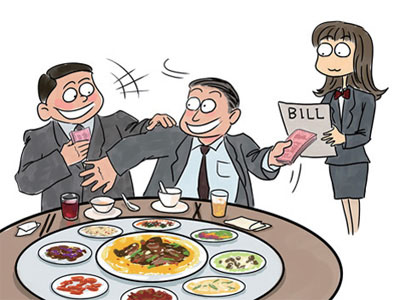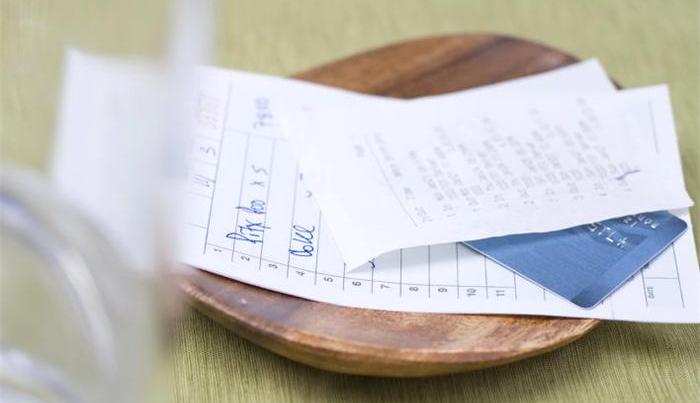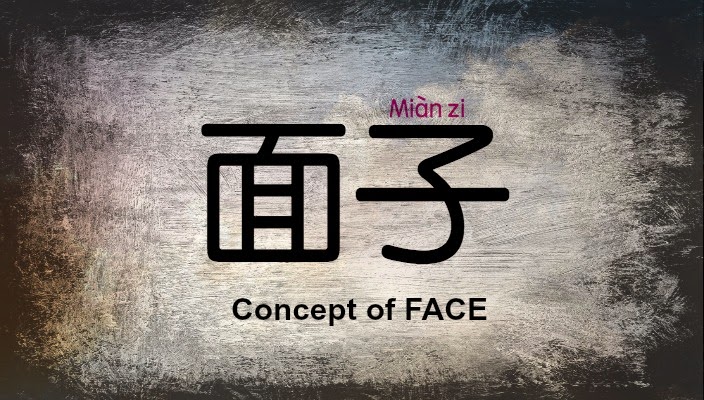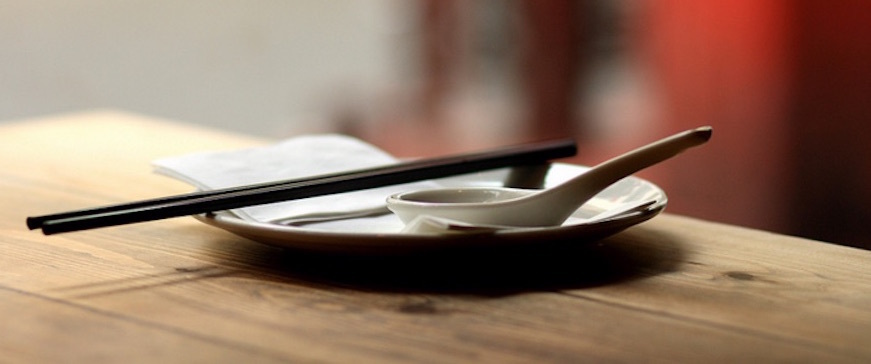2016年7月
文/Andy Lee
A few years ago I took a holiday to Hong Kong with Lisa. It was the first time we went back following our wedding, so naturally we had a bunch of people to see. Or rather, a bunch of people that wanted to see us and meet the new husband or wife.
I thoroughly enjoyed the perks of having lots of aunties and uncles. Some of you will know what I mean by this – every meal was paid for. I loved it. Just sit, smile and nod when I don’t understand the conversations (this happened a lot), enjoy the good food, and say goodbye. Then repeat. For two weeks.
Unfortunately my conscience didn’t let me get away with it for the whole holiday, even if my wallet was more than happy to stay in my pocket. So before one meal with several relatives I committed to paying the bill beforehand. I pretended to go the bathroom and made my way to the counter to pay the bill.
I was ready for my moment of glory, I could picture it already – People’s faces lighting up with surprise and joy whilst thanking me enthusiastically and complimenting me on my foresight and kindness. “You’re all very welcome” I was going to say. Well, it didn’t quite happen like that. In fact, it was the complete and total polar opposite of that. Shock horror!
One of the relatives came up and just unleashed fury on me. With a face like anger itself, she started shouting at me, and waving her arms about in the restaurant. Strangely this didn’t draw attention – an indication of this being a far too common occurrence? I felt like I was at school again. Her eyes and ears were steaming as she bellowed at me, “What did you do that for?! Are you stupid?! How dare you?! The whole bill?! You don’t even live here?! You’d better not do anything stupid like that again”. She left the restaurant huffing and puffing. Meanwhile, I left the restaurant with my tail between my legs …”You’re all very welcome…” muttering and whimpering to myself.
They made me wish I hadn’t tried to be so generous. My wallet agreed. This phenomenon is actually not unique. Even more bizarrely than it happening to me, is that it happens in restaurants all over the world. What is going on? Is it fighting to be generous, or are we fighting for something else?
What are we really trying to do when we try to pay? On the surface it seems like an act of generosity and open handed kindness. But when the ritual descends into potential fisticuffs, it makes me question whether this action stems from the heart or somewhere else?
I believe that this tradition is rooted in a combination of status, pride, and respect. The Chinese are a very proud people. Being able to demonstrate wealth can be a way of showcasing our status to the world. Paying for others to eat is an example of that. And when the chance is taken away to promote our status and authority and to buy respect, we are not happy.
We feel under-respected, and we lose face in front of our peers and those who we think need to look up to us. Understand, this isn’t a hard and fast rule, but it does happen far too often.
So what’s the alternative? I have learnt to accept acts of kindness with a thankful and appreciative heart. To the point where I believe it is actually unfair to refuse or fight against someone’s act of kindness because that stems the flow of grace, of blessing, of hospitality. If someone truly wants to bless you, appreciate it and say thank you. Allow them and let them be kind to you.
The saying “be blessed to be a blessing” fits perfectly.
Pass the blessing on. Pay it forward. Carry the grace through into your own actions with others. By the way this is exactly how God’s love ought to work in our lives.
We do not follow the Bible out of compulsion but out of an overflow of His love for us. The extent to which we experience God’s love in our own lives, dictates whether our own actions are rooted in self-promotion and selfimposed obligation, or outward-facing sacrificial love.
應否付賬?
文/Andy Lee
翻譯/劉愛群
幾年前,我和太太麗莎到香港度假。這是我們婚後第一次回港探親,所以自然有一大群人要見,或者應該說,有一大群人想見見我們這對「新人」。
擁有這麼多阿姨和叔叔確是有福。你們當中有些人會明白我是什麼意思 – 每一餐膳食都有人作東道 – 我也很享受。當我聽不懂談話的內容時(這情況發生了許多次),只需坐著、微笑及點頭,享受美食,然後說再見。然後再重複。兩個星期就這樣度過。
不幸的是,雖然我的錢包更樂意留在我的口袋裡,我的良心卻沒有讓我整個假期都是這樣。所以,有一次跟幾個親戚吃飯之前,我就決心預先結賬。我假裝去洗手間,其實是到櫃檯付賬。
我滿以為終於可以威風一次,憧憬他們滿臉閃耀著驚奇和喜悅,同時熱烈地多謝我,讚賞我的先見之明和慷慨。我正準備說:「你們不用客氣!」然而,事情的發展卻完全出乎我意料之外,跟我想像的完全相反,簡直是恐怖震撼!
其中一位親戚上前向我大發雷霆,滿臉怒容的她,在餐館裡手舞足蹈,向我大聲疾呼。奇怪的是,她的誇張舉動似乎沒有引起旁人注目,是否意味著這是司空見慣的情景呢?我感覺自己像個小學生,她七竅生煙地向我怒吼:「為什麼這樣做?!你白痴的嗎?!竟敢這樣?!全數付了賬?!你又不是香港人!以後你別那麼笨啦。 」她氣沖沖地走出餐館,我則像一隻喪家狗似的,垂頭喪氣地離開,自言自語的抱怨着說:「你們不用客氣!」
他們令我巴不得沒有那麼慷慨,我的錢包大概也同意。事實上,這個現象並非罕有,更奇怪的是,它不但發生在我身上,在世界各地的餐館也經常出現。這是怎麼回事?是爭取表現大方,還是爭取別的東西呢?
當我們搶著付錢時,我們真正想要做什麼?表面上看來,這似乎是慷慨大方的舉動。但當這些禮儀演變為「武鬥」時,便使我質疑這種行動是否別有用心?
我相信,這傳統是源於人們追求身份地位、虛榮、及希望得到尊重。中國人的自尊心特別強。炫耀財富是向人展示身份地位的一種方式。請客吃飯就是一個例子,藉此提高個人地位及權威,換來「尊重」。而當這機會被人奪走時,我們便不開心了。
我們覺得別人對自己不夠尊重,在同儕及那些我們認為應該尊敬我們的人面前丟臉。明白了,雖然這不是一個硬性的規定,但確實太常見了。
怎樣應付好呢?我已經學會了懷著感激的心,大方地接受別人的一番好意,我甚至相信拒絕他們是不公平的,會辜負了別人的好意、祝福和款待。如果有人真心想祝福你,就感激地說聲多謝,讓他們善待你吧。
「接受祝福,並成為別人的祝福。」這句話說得好,讓祝福繼續傳開去,身體力行地傳遞恩典吧。我們的生命就應該這樣傳揚上帝的愛。我們並非被逼遵從聖經的教導,而是因為上帝的愛在我們的生命中溢出,激勵著我們以行動向別人彰顯那犧牲的愛,而不是為了自我炫耀,或覺得這是我們強加於自己身上的義務。






